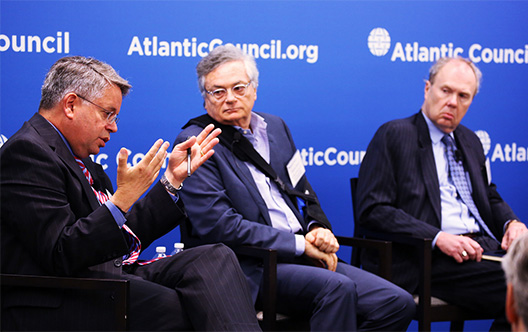 Mathew Burrows, Andrew Hoehn, and Moisés Naím joined moderator Francis Rose of Federal News Radio for Disrupting Geopolitics, the second panel of Atlantic Council’s Disrupting Defense conference. General Martin Dempsey, chairman of the Joint Chiefs of Staff, opened the conference, highlighting the challenges of today’s geopolitical environment from a military perspective, stating that the application of power was simpler when the foe was similar in strength and form. Today, power is more diffused, and the instruments of power must be used differently, with different calculations of risk.
Mathew Burrows, Andrew Hoehn, and Moisés Naím joined moderator Francis Rose of Federal News Radio for Disrupting Geopolitics, the second panel of Atlantic Council’s Disrupting Defense conference. General Martin Dempsey, chairman of the Joint Chiefs of Staff, opened the conference, highlighting the challenges of today’s geopolitical environment from a military perspective, stating that the application of power was simpler when the foe was similar in strength and form. Today, power is more diffused, and the instruments of power must be used differently, with different calculations of risk.
The diffusion of power, noted Burrows, director of the Strategic Foresight Initiative at the Brent Scowcroft Center on International Security at the Atlantic Council, can be seen as a result of the current nature of technology itself. The world is now in what he called the “hacker era”—an era in which people, not just powerful governments, have access to technology and have the ability to advance it either for good or for nefarious purposes. Naím, a senior associate at the Carnegie Endowment for International Peace, echoed that assertion by stating that the most disruptive technologies of this era are cyber technologies, drones, and improvised explosive devices (IEDs). All of these technologies can be manipulated by the common man and are thus not under the sole control of modern, well-funded military organizations or governments. These disruptive technologies are, “in the hands of the many, not the few,” Andrew Hoehn, a senior vice president for research and analysis at the RAND Corporation, added. The important point about this technology is not so much what, but who has their hands on such technology. The first to develop a technology, as in the case of IEDs, is often not the one to employ it in a manner that is truly disruptive.
The rise of individual empowerment has diffused the power of nation-states. In the case of the cyber domain, the private sector may even have more influence than the governments. The panel was unanimous in recognizing that in the wake of a major cyber disruption it would be the private sector that would have the dominant role in reconstruction, not the government. The dark side of the accessibility to technology and information is the possibility of radicalization in unexpected quarters, which, as the panel noted, will play out in a constant tension between the government’s need for surveillance and the personal desire for privacy.
As emphasized by General Dempsey in his opening keynote, the global great powers will have to learn to use national instruments of power differently. The second panel echoed that concern by elaborating that micro-powers have been created by the combination of individual empowerment and the resulting diffusion of government power. Naím stated that “these micro-powers can’t win but they have the ability to block or deny a victory.” These numerous micro-powers have to be dealt with, but their rise is often unpredictable. Naím also cited the new ways in which national power is leveraged by reminding the audience of events in Ukraine and Venezuela. In those nations, Russian and Cuban forces, respectively, have come in to influence events in a way that is different from what was seen by traditional military forces in the past. “In the future,” Naím said, “as civil society becomes more of a factor, the more militaries will start to look like an NGO [nongovernmental organization].”
The panel ended by warning that the old forces of nationalism and religion will not go away, but new challenges will also continue to erupt. Having greater technology and resources is no longer as militarily advantageous as it used to be, but new levers of power exist and the challenge is in how to make use of them.
US Marine Corps Senior Fellow Mark Revor provides a few summary thoughts on “Disrupting Geopolitics” the second panel at the Disrupting Defense: Dynamic Security in an Age of New Technologies conference. Speaking were Mathew Burrows, Director, Strategic Foresight Initiative, Atlantic Council; Andrew R. Hoehn, Senior Vice President, Research and Analysis, RAND Corporation; Moisés Naím, Senior Associate, International Economics Program, Carnegie Endowment for International Peace. Francis Rose, Host, “In Depth,” Federal News Radio moderated the session.
